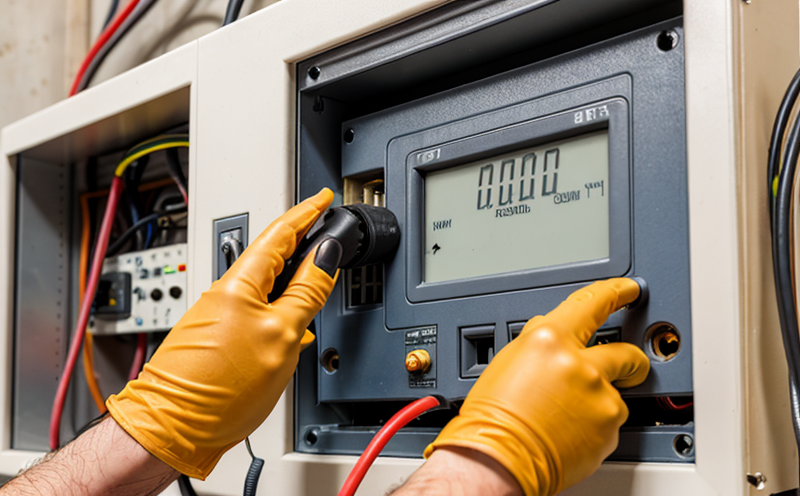IEC 62923-1 Electrical Testing of Onboard Ship Battery Systems
The IEC (International Electrotechnical Commission) 62923-1 standard provides the framework for electrical testing of onboard ship battery systems. This service ensures that these critical components meet strict safety and performance criteria, which are essential for maritime operations worldwide. The IEC standards are widely recognized and adopted by industries to ensure consistent quality and reliability.
Onboard ship batteries play a crucial role in modern marine technology, providing power during emergencies or when the vessel is not connected to shore power. These batteries can include lithium-ion, lead-acid, and other types of cells designed for maritime applications. The IEC 62923-1 standard helps guarantee that these systems are safe, efficient, and reliable under various operating conditions.
The testing process involves a series of rigorous checks to assess the electrical characteristics of the onboard battery system. This includes measuring voltage, current, impedance, and other key parameters. The tests can be conducted in laboratory settings or on-site at shipyards, depending on the client's needs.
For accurate and reliable results, we use specialized equipment that adheres strictly to IEC standards. Our team of experts ensures that all testing procedures are followed precisely, providing clients with confidence in the integrity of their onboard battery systems.
The importance of this service cannot be overstated, especially given the increasing complexity of modern shipboard electrical systems. Ensuring compliance with IEC 62923-1 not only enhances safety but also helps meet regulatory requirements and improve overall performance. By partnering with us for your electrical testing needs, you can rest assured that your onboard battery systems are in top condition.
Our comprehensive approach to testing ensures that every aspect of the system is evaluated thoroughly. From initial assessment through final analysis, we provide detailed reports that highlight any areas needing improvement or attention. These insights help our clients make informed decisions about maintenance and upgrades, ultimately extending the life cycle of their onboard battery systems.
Applied Standards
| Standard | Description |
|---|---|
| IEC 62923-1:2018 | Electrical testing of onboard ship battery systems. |
| IEC 62547-2:2016 | Environmental conditions for storage, transport and handling of batteries intended for use in ships. |
The IEC standards mentioned above provide the necessary guidelines to ensure that onboard battery systems meet international quality and safety benchmarks. Compliance with these standards is crucial not only for ensuring operational reliability but also for meeting regulatory requirements set by various maritime authorities around the world.
Our laboratory adheres strictly to these standards during all phases of testing, from setup to final analysis. This commitment ensures that our clients receive accurate results they can trust. By following these internationally recognized protocols, we guarantee consistency and accuracy in every test conducted under this standard.
Scope and Methodology
| Aspect | Description |
|---|---|
| Testing Parameters | Voltage, current, impedance, temperature sensitivity. |
| Equipment Used | High-precision measurement instruments calibrated according to IEC standards. |
The scope of our testing under the IEC 62923-1 standard covers a wide range of parameters essential for evaluating the electrical performance of onboard ship battery systems. These include voltage checks, current assessments, impedance measurements, and temperature sensitivity tests. Each parameter plays a vital role in determining whether the system meets specified criteria.
Our methodology is designed to ensure thoroughness and precision throughout each stage of testing. We begin by carefully preparing the specimen according to industry best practices. Once prepared, we employ advanced measurement instruments that have been calibrated against IEC standards. This ensures that all readings are accurate and reliable.
The testing process itself involves multiple steps aimed at comprehensively assessing different aspects of the onboard battery system's electrical characteristics. For instance, during voltage checks, we monitor the system under various load conditions to ensure consistent performance across the board. Similarly, for current assessments, we examine how efficiently electricity flows through the system.
Impedance measurements help identify any potential issues within the circuitry, while temperature sensitivity tests assess how well the battery handles changes in ambient temperatures. By conducting these thorough evaluations, we can pinpoint areas requiring attention or improvement, thereby enhancing overall reliability and safety.
Customer Impact and Satisfaction
- Enhanced safety through rigorous testing protocols.
- Compliance with international standards ensuring regulatory approval.
- Improved operational efficiency resulting in reduced downtime.
- Extended lifespan of onboard battery systems due to timely maintenance recommendations.
The impact of our IEC 62923-1 electrical testing service extends far beyond mere compliance; it directly contributes to improved safety, operational reliability, and overall satisfaction among customers. By adhering strictly to the specified standards, we help ensure that onboard battery systems are safe and efficient, which is critical for maritime operations.
Our clients benefit from enhanced safety as our thorough testing identifies potential hazards early on. This proactive approach not only prevents accidents but also fosters a culture of continuous improvement within organizations. Additionally, by ensuring compliance with international standards, we facilitate easier approval processes when dealing with regulatory bodies.
In terms of operational efficiency, our tests reveal any inefficiencies or issues that could lead to unplanned downtime. With this information at hand, clients can address these concerns promptly, minimizing disruptions and maximizing productivity. Furthermore, the recommendations for timely maintenance provided by our reports contribute significantly towards extending the useful life of onboard battery systems.





